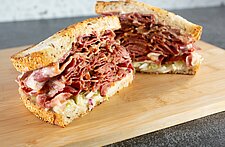By Chef Matthew O'Connell
Nobody wants to waste food in the kitchen; food waste equals money lost and money lost means you’re out of a job. Any good restaurateur will tell you this yet full service restaurants still manage to waste nearly 50 million pounds of food per year with quick service restaurants tossing 85 million pounds annually. Households aren’t immune from this trend either as the average American household wastes over 1000 pounds of food per year. With an estimated 125 million households in the US alone, it should come as no surprise that America throws an estimated 160 billion dollars into landfills every year with nearly 40 percent of food wasted. You may ask yourself, “So what? Why should I care? Food spoils and we have plenty of it.” You would be right. We do have plenty of food - at least for now.
The Population Institute somewhat conservatively estimates the world population to be at 9.1 billion people by 2050 and the U.N. estimates 11.2 billion by 2100. World food production will need to increase by at least 70 percent to sustain this increase in population. Assuming that this is even possible with technological challenges looming, the finite nature of resources on Earth, and growing concern over environmental changes and their effect on the food system, what can we as individuals, restaurants, and companies do to make a difference with this daunting problem?
CLICK HERE to view last month's Culinary Chronicles: Reviewing the Top Food Trends of 2016!
Dan Barber of Blue Hill fame has an elegant solution – literally elegant – to challenge the issue. In March of 2015, Barber converted his Michelin starred restaurant into a fine dining pop up named wastED. For 3 weeks, this pop up in Greenwich Village partnered with local businesses and utilized their food waste to produce dishes worthy of any fine dining establishment. With a plethora of influential guest chefs putting their ideas and hard work into the project, Barber and his team created dishes such as the veggie burger made from the vegetable pulp left over from a local juicing establishment. Highly successful during its short run, Barber’s hope with this project and with his other venture at Stone Barns is to inspire people to look critically at their food system and think outside the box before tossing their food in it. Introspection and education is the key to innovation for this chef and, while his contribution to this effort may not be felt for years, his devotion to this cause will hopefully inspire change.
CLICK HERE to subscribe to weekly culinary insights from in-sight!
In addition to the efforts of Barber and his team, other individuals and groups have championed this cause in myriad ways. A restaurant in Berlin known as Restlos Glücklich (or Happy Family) takes the “ugly” foods rejected by other vendors due to aesthetic issues to make their (mostly) vegetarian menu. Between 70 and 80 percent of the food put on their table is sourced in this manner. In addition to its rotating menu, this restaurant offers cooking classes to its neighbors to help them learn skills to utilize everything in their fridge.
Anthony Bourdain will also weigh in on the matter when he releases his upcoming documentary, Wasted! The Story of Food Waste. His film will aim to put a spotlight on this issue and benefit from his notoriety garnered from his no holds barred views showcased through his literary and television efforts to inspire a larger audience.
Developed in Denmark, an app released for IOS and Android operates with the mission “to save food, save money and save the planet” by connecting its users with restaurants who might be ready to chuck an entire cake or pizza. Too Good to Go allows you to order food that would be thrown away otherwise at a discounted rate from local restaurants, cafes, and bakeries. So far, their efforts have spread to six countries throughout Europe and claim to have prevented 200 tons of carbon dioxide emissions while providing thousands of delicious meals.
On the corporate front, a number of businesses including the Campbell Soup Company, General Mills, and Pepsico to name a few have banded together to form the U.S. Food Loss and Waste 2030 Champions. The goal of this group is to reduce food waste in all of their operations to 50 percent by 2030. Aside from benefitting the companies financially in some regards, the move aims to promote change in our food system with an emphaisis on food security, resource conservation, and climate change.
CLICK HERE to see the Top Trends for 2017 from Starchefs ICC!
Food waste may not be the largest problem facing our country at present but it is one that is preventable with a bit of forethought and creativity and will become more pressing with time. Installing programs at home or work to ensure that the refrigerator remains fresh and the trash can empty will help to increase the bottom line now and into the future. The issue at hand will not be solved by Dan Barber, Anthony Bourdain, or you alone but if enough people absorb their knowledge and adapt it to their daily routine, the problem of food waste should be curtailed drastically.
Check out the articles below for more information about what's going on with food waste:

Anthony Bourdain to Produce Documentary on Food Waste

At Chef Dan Barber's Pop-up WastED, Bruised and Misshapen Bits are Dinner

2030 Food Waste Champions Annouced

Eatery Makes Delicious Meals from Food that Stores Refuse to Sell




